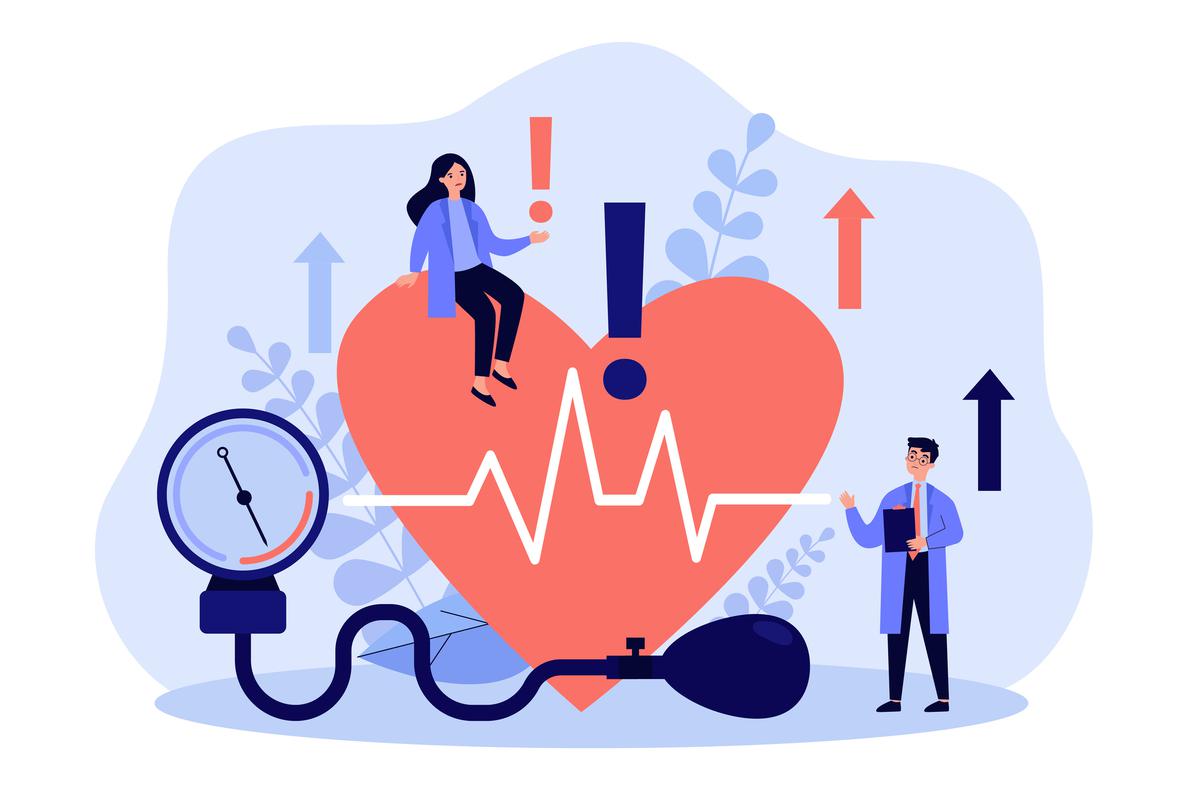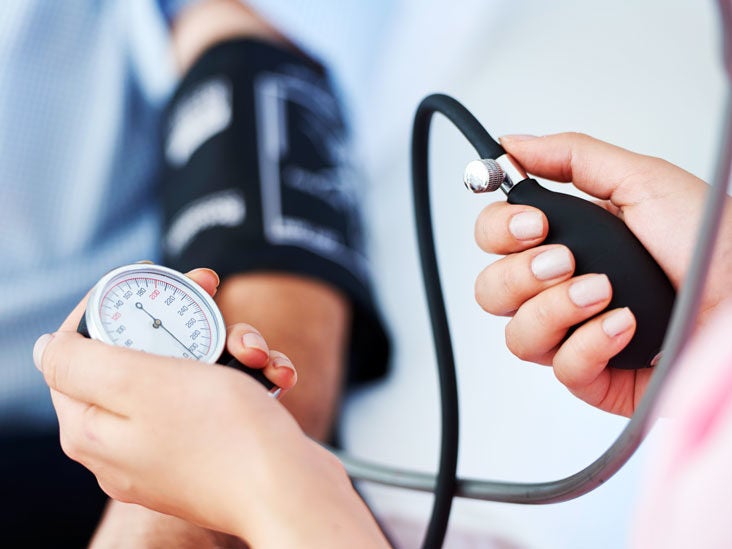Refractory hypertension or persistent hypertension is the blood pressure not dropping below 140/90mmHg after three months of treatment. It is one of the most common chronic conditions seen in primary care and often results in multiple medical visits, long-term treatment, and complications.
Refractory hypertension is the term used to describe the condition where the blood pressure is high despite being treated with multiple medications. It is associated with an increased risk of cardiovascular disease. This topic has been discussed on the forum in the past.
Refractory hypertension is the blood pressure that remains persistently elevated despite treatment with three or more different antihypertensive drugs, two or more antihypertensive drugs, or one antihypertensive drug at the maximum dose tolerated by the patient.
Hypertension is a condition in which there is high blood pressure. It is often called “the silent killer” because it can lead to heart attacks, strokes, and other complications. An increased risk of heart attack and stroke among people with hypertension is associated with poor blood pressure control.
There are millions of people suffering from refractory hypertension. If you’re one of them, don’t let your condition worsen. Instead, learn how to reverse it with natural remedies.
When your blood pressure is too high, you can suffer several health problems, including stroke, heart disease, kidney disease, and even death.
If you have hypertension, you may already be familiar with this condition.
While there are many methods for lowering your blood pressure, some may require a doctor’s prescription. Other methods may not even work.
This article will discuss various ways to deal with refractory hypertension.

Refractory Hypertension
Refractory hypertension is defined as persistent blood pressure that is not controlled by any medication and does not respond to lifestyle changes. It’s a serious condition that needs immediate treatment. The disease is usually chronic, but it can worsen and become life-threatening. Problems with the kidneys or adrenal glands may cause it. Refractory
What if there was a cure for high blood pressure? This article we’lli look at refractory hypertension and show you how to treat it using a natural remedy.
The problem with conventional medications that treat high blood pressure is that they have dangerous side effects.
But what if there were a safe, natural approach that could reduce blood pressure and prevent further damage to your cardiovascular system?
In this article, we’ll show you how to reverse hypertension naturally. We’ll discuss all the things that could cause high blood pressure and show you how to eliminate them.
Refractory hypertension is a condition in which a person is hypertensive even though they take medicine and their blood pressure remains high. This causes serious problems such as heart attacks and strokes.
If you’re reading this blog, chances are you have hypertension. This is the number one risk factor for heart attack, stroke, and other health problems.
If you’re struggling with hypertension and your doctor says there’s nothing they can do to help, this blog post might be the answer you’ve been waiting for.
Refractory hypertension is a condition that kills hypertension. It’s the only treatment that can cure hypertension.
What Does It Mean?
Refractory hypertension refers to high blood pressure that medication cannot control. Different types of refractory hypertension include resistant hypertension (RHTN) and persistent hypertension (PHN). RHTN is defined as uncontrolled blood pressure after three months of taking medication to lower blood pressure. This type of hypertension is more common in women.
PHN is defined as uncontrolled blood pressure after six months of taking medication. This type of hypertension is more common in men. Both types of refractory hypertension have a higher risk of developing heart disease.
If you have RHTN, your blood pressure may be high, but your medications can lower it back to normal. You may not feel any symptoms and may not experience the side effects of hypertension.
Refractory hypertension is when a person has high blood pressure (hypertension) that cannot be controlled by medication. Refractory hypertension has two forms: “primary” and “secondary.” “Primary” refers to an underlying cause for hypertension, such as high sodium intake or kidney disease. “Secondary” refractory hypertension refers to the failure of a hypertensive medication regimen to control blood pressure. A person may have multiple reasons for failing to respond to medication.
Yes, they can. After a transplant, some patients have their blood pressure controlled by taking just two medications. This is called normotension.

Treatment
Refractory hypertension is when the blood pressure remains high despite multiple antihypertensive medications.
This condition is characterized by a lack of response to antihypertensive treatment, which makes it a difficult problem to treat.
Several things, including medication side effects, poor adherence, and various other issues, can cause it.
As you may know, hypertension is when your blood pressure is too high. This can cause several health problems, including stroke and heart disease. It’s a major risk factor for these conditions and other complications.
Refractory hypertension is when your blood pressure doesn’t respond to medication and is a common condition. It can cause serious health complications if left untreated.
Fortunately, many treatments are available, and Mthey’redica covers them. But it can be hard to determine which is right for you. That’s why I created this blog to share all the information you need to know about refractory hypertension.
I hope you find this resource helpful.
Symptoms
Refractory hypertension is often used as a catch-all term for patients who are resistant to treatment.
However, I prefer to consider it a clinical term to describe a specific subtype of hypertensive patients.
The only thing worse than having a chronic condition is being unable to control it. That’s why it’s important to know your options when dealing with refractory hypertension.
I’m going to tell you the truth, I have been in your shoes. When I was diagnosed with HTN, my doctor said that there was nothing else he could do for me other than medicate me. And I didn’t want that.
I went to the web looking for alternative ways to treat my condition. I found many people recommending exercise, but it wasn’t working for me. I wanted to find another way to help my body regulate my blood pressure naturally.
I was sold when I discovered that I could buy CBD oil online. After using the product for over two months, I haven’t had any blood pressure issues.
You may also have heard that cannabis has some medicinal properties. Well, the truth is hemp contains cannabinoids that can be u managyou conditions such as anxiety, insomnia, and arthritis.

Frequently Asked Questions (FAQs)
Q: What’s the most important thing for people to know about your type of hypertension?
A: We have two different types of hypertension — Refractory Hypertension and Essential Hypertension.
Q: What’s the difference between the two?
A: Refractory Hypertension doesn’t respond to medication. If you take the right kind of medicine, it can be controlled.
Q: How common are these conditions?
A: Both Refractory Hypertension and Essential Hypertension are very common. We can only guess how common they are because there aren’t enough studies on them. We know that many of our doctors are not aware of these two conditions.
Q: Are they treated in the same way?
A: No. Refractory Hypertension is treated by dialysis or by kidney transplant.
Q: How did you find out you had high blood pressure?
A: A doctor found out after I was pregnant with my first child. He said I had refractory hypertension and that it would not go away no matter what I did.
Q: Did you try any medications?
A: Yes. I started taking amlodipine and then metoprolol, which helped me. I also tried ning all three medications, but the side effects were too much for me.
Q: What did you do when the symptoms became more severe?
A: I would live with them and hope they would improve independently. If not, I would take a break from working for a few months and take the medication again when I return. I just kept trying until I got rid of them.
Myths About Hypertension
1. Refractory hypertension is a temporary condition.
2. Refractory hypertension is reversible.
3. Refractory hypertension does not require any specific treatment.
4. There are no side effects from medications.
Conclusion
In the case of refractory hypertension, you may need to see a specialist, such as a cardiologist. Your doctor may prescribe medication to reduce blood pressure.
If these medications are ineffective, you may need to see a specialist. The purpose of seeing a specialist is to find the underlying cause of your hypertension.
Your doctor may try to diagnose your condition by performing an EKG, echocardiogram, carotid artery ultrasound, or cardiac catheterization. They may also do a blood test called a 24-hour urine collection.
Your doctor may want to check your heart with an EKG and an echocardiogram. An echocardiogram can show abnormalities in your heart. Some people have a heart that pumps too much blood, leading to high blood pressure.
If you have this condition, your doctor may perform an ultrasound of the carotid arteries (carotid artery Doppler). This test checks for blockages in the carotid arteries. The 24-hour urine collection will help determine whether there is kidney damage or other medical problems.









